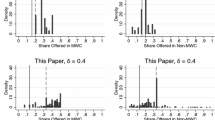Abstract
We study an organized market for votes, in which trade is directed by a market "specialist". This market mechanism always produces an equilibrium outcome, and whenever vote buying occurs the alternative chosen is Pareto superior to the alternative that would be chosen without trade. We then characterize the equilibrium outcomes in a one-dimensional policy space, and show that if the distribution of ideal points is skewed enough, then the equilibrium with vote buying differs from the equilibrium without vote buying (the median ideal point). This difference reflects the ability of an intense minority to obtain a policy it prefers in exchange for side-payments.
Similar content being viewed by others
References
Becker, G. (1983). A theory of competition among pressure groups for political influence. Quarterly Journal of Economics 98: 371–400.
Bernholz, P. (1973). Logrolling, Arrow paradox and cyclical preferences. Public Choice 15: 87–96.
Bernholz, P. (1974). Logrolling, Arrow paradox and decision rules: A generalization. Kyklos 27: 49–62.
Bergstrom, T.C. and Goodman, R.P. (1973). Private demands for public goods. American Economic Review 63: 280–296.
Brams, S.J. and Riker, W.H. (1973). The paradox of vote trading. American Political Science Review 67: 1235–1247.
Buchanan, J.M. and Tullock, G. (1962). The calculus of consent. Ann Arbor: University of Michigan Press.
Clark, T.N. and Ferguson, L.C. (1983). City money. New York: Columbia University Press.
Coleman, J. (1966). The possibility of a social welfare function. American Economic Review 56: 1105–1122.
Coughlin, P. (1992). Probabilistic voting theory. New York: Cambridge University Press.
Denzau, A.T. and Munger, M.C. (1986). Legislators and interest groups: How unorganized interests get represented. American Political Science Review 80: 89–106.
Eulau, H. and Prewitt, K. (1973). Labyrinths of democracy. Indianapolis: Bobbs-Merrill.
Feldstein, M.S. (1975). Wealth neutrality and local choice in public education. American Economic Review 65: 75–89.
Ferejohn, J. (1974). Sour notes on the theory of vote trading. Mimeo, California Institute of Technology.
Goodman, J.S. (1975). The dynamics of urban government and politics. New York: MacMillan.
Groves, T. (1973). Incentives in teams. Econometrica 41: 617–631.
Haefele, E. (1971). A utility theory of representative government. American Economic Review 61: 350–365.
Kadane, J.B. (1972). On division of the question. Public Choice 13: 47–54.
Koford, K. (1982). Centralized vote trading. Public Choice 39: 245–268.
Koford, K. (1987). Scale economies and rent-seeking in legislative parties. Public Choice 52: 35–55.
Koford, K. (1993). The median and the competitive equilibrium in one dimension. Public Choice 76: 276–288.
Ladd, H.F. (1975). Local education expenditures, fiscal capacity, and the composition of the property tax base. National Tax Journal 28: 145–159.
Levy, J. and Philipson, T. (1992). Vote trading and the Coase theorem. Unpublished manuscript, University of Chicago.
Lovell, M.C. (1978). Spending for education: The exercise of public choice. Review of Economics and Statistics 60: 487–495.
Mueller, D.C. (1973). Constitutional democracy and social welfare. Quarterly Journal of Economics 87: 61–79.
Mueller, D.C. and Murell, P. (1986). Interests groups and the size of government. Public Choice 48: 125–145.
Park, R.E. (1967). The possibility of a social welfare function: Comment. American Economic Review 57: 1300–1304.
Philipson, T. and Snyder, J.M. Jr. (1992). Voting buying vs. the median voter model: Empirical evidence from municipal spending. Unpublished manuscript, University of Chicago.
Poole, K. and Rosenthal, H. (1985). A spatial model for legislative roll call analysis. American Journal of Political Science 29: 357–384.
Poole, K. and Rosenthal, H. (1991). Patterns of congressional voting. American Journal of Political Science 35: 228–278.
Romer, T. and Rosenthal, H. (1983). A constitution for solving asymmetric externality games. American Journal of Political Science 27: 1–26.
Salop, S. (1979). Monopolistic competition with outside goods. Bell Journal of Economics 10: 141–156.
Schneider, J.E. (1979). Ideological coalitions in congress. Westport, CT: Greenwood.
Schwartz, T. (1977). Collective choice, separation of issues and vote trading. American Political Science Review 71: 999–1010.
Schwartz, T. (1981). The universal instability theorem. Public Choice 37: 487–501.
Shubik, M. and Van der Heyden, L. (1978). Logrolling and budget alocation games. International Journal of Game Theory 7: 151–162.
Snyder, J.M. Jr. (1991). On buying legislatures. Economics and Politics 3: 93–109.
Weiss, J.H. (1988). Is vote-selling desirable? Public Choice 59: 117–194.
Author information
Authors and Affiliations
Rights and permissions
About this article
Cite this article
Philipson, T.J., Snyder, J.M. Equilibrium and efficiency in an organized vote market. Public Choice 89, 245–265 (1996). https://doi.org/10.1007/BF00159358
Accepted:
Issue Date:
DOI: https://doi.org/10.1007/BF00159358



